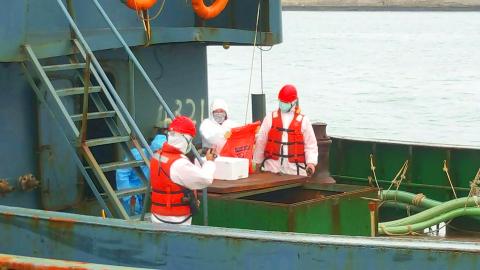Coast guard personnel yesterday confiscated raw pork from a Chinese ship in the nation’s contiguous zone near Penghu County, officials said.
The oil supply vessel was detected in waters about 20 nautical miles (37km) southwest of the county’s Cimei Township (七美) and increased speed after a coast guard patrol broadcast several warnings, the Coast Guard Administration said in a news release.
Coast guard personnel intercepted and boarded the ship, finding 10kg of raw pork packed in its onboard refrigerator, Fleet Branch official Chan Wen-chung (詹文中) said by telephone, adding that the ship’s crew claimed the pork was for their own consumption.

Photo: CNA
The pork was transferred to Council of Agriculture (COA) officials for disposal, and the coast guard took the six crew members to Magong City (馬公) for further questioning to determine whether they contravened the Act Governing Relations Between the People of the Taiwan Area and the Mainland Area (臺灣地區與大陸地區人民關係條例), Chan added.
COA Deputy Minister Huang Chin-cheng (黃金城) said that samples of the pork would be tested for African swine fever, while the remainder would be destroyed.
The crew might not be fined for storing the pork, even if the samples tested positive for the disease, as that they were not attempting to smuggle the pork into Taiwan, he said.
Since China reported its first infection of African swine fever in early August last year, the disease has spread to 23 provinces and regions, with a total of 104 cases reported as of Wednesday last week, although no new cases have been reported since then, council data showed.
China might have stopped reporting new infections to the World Organization for Animal Health, because it has been unable to keep the disease from spreading, Huang said.
The interval between new confirmations of infected pork products seized at customs has decreased from 64 days initially to less than a week, indicating that the disease is spreading unabated in China, he said.
As of yesterday, 12 seized pork products from China had tested positive for the disease, with the latest two, which were pork sausage products, confirmed on Thursday last week, council data showed.
To bolster quarantine checks at customs, the council is seeking funds from the Executive Yuan’s reserve budget of NT$500 million (US$16.2 million) to increase the number of sniffer dogs and X-ray scanners, but review of the proposed budget has been delayed due to a Cabinet reshuffle, Huang said, adding that he hopes the proposal will be approved soon.

A magnitude 7.0 earthquake struck off Yilan at 11:05pm yesterday, the Central Weather Administration (CWA) said. The epicenter was located at sea, about 32.3km east of Yilan County Hall, at a depth of 72.8km, CWA data showed There were no immediate reports of damage. The intensity of the quake, which gauges the actual effect of a seismic event, measured 4 in Yilan County area on Taiwan’s seven-tier intensity scale, the data showed. It measured 4 in other parts of eastern, northern and central Taiwan as well as Tainan, and 3 in Kaohsiung and Pingtung County, and 2 in Lienchiang and Penghu counties and 1

A car bomb killed a senior Russian general in southern Moscow yesterday morning, the latest high-profile army figure to be blown up in a blast that came just hours after Russian and Ukrainian delegates held separate talks in Miami on a plan to end the war. Kyiv has not commented on the incident, but Russian investigators said they were probing whether the blast was “linked” to “Ukrainian special forces.” The attack was similar to other assassinations of generals and pro-war figures that have either been claimed, or are widely believed to have been orchestrated, by Ukraine. Russian Lieutenant General Fanil Sarvarov, 56, head

FOREIGN INTERFERENCE: Beijing would likely intensify public opinion warfare in next year’s local elections to prevent Lai from getting re-elected, the ‘Yomiuri Shimbun’ said Internal documents from a Chinese artificial intelligence (AI) company indicated that China has been using the technology to intervene in foreign elections, including propaganda targeting Taiwan’s local elections next year and presidential elections in 2028, a Japanese newspaper reported yesterday. The Institute of National Security of Vanderbilt University obtained nearly 400 pages of documents from GoLaxy, a company with ties to the Chinese government, and found evidence that it had apparently deployed sophisticated, AI-driven propaganda campaigns in Hong Kong and Taiwan to shape public opinion, the Yomiuri Shimbun reported. GoLaxy provides insights, situation analysis and public opinion-shaping technology by conducting network surveillance

‘POLITICAL GAME’: DPP lawmakers said the motion would not meet the legislative threshold needed, and accused the KMT and the TPP of trivializing the Constitution The Legislative Yuan yesterday approved a motion to initiate impeachment proceedings against President William Lai (賴清德), saying he had undermined Taiwan’s constitutional order and democracy. The motion was approved 61-50 by lawmakers from the main opposition Chinese Nationalist Party (KMT) and the smaller Taiwan People’s Party (TPP), who together hold a legislative majority. Under the motion, a roll call vote for impeachment would be held on May 19 next year, after various hearings are held and Lai is given the chance to defend himself. The move came after Lai on Monday last week did not promulgate an amendment passed by the legislature that